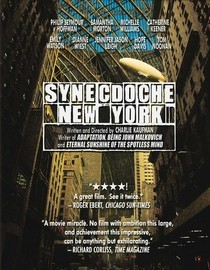Synecdoche, New York (2008)
Director: Charlie Kaufman
Writer: Charlie Kaufman
Starring: Philip Seymour Hoffman, Catherine Keener, Michelle Williams, Tom Noonan, Samantha Morton, Hope Davis, Emily Watson, Jennifer Jason Leigh, Dianne Wiest...did i forget anyone?
Synopsis
Ostensibly about a stage writer/director's use of a MacArthur Genius Grant to create a fully immersive theater experience, this is more of an exploration of the consciousness of that person... or of our own individual consciousnesses and individualities...or of the collective consciousness and togetherness... or of something less determinate.
The Woman
well, i didn't not,like it. i didn't exactly like it either. i can see this derived from a fork in the road when he made "adaptation" (which i liked). some sort of reality based theater production where the viewer and the actors and the director can't tell where they are and what the heck is going on and how did i come to be here exactly and i am dreaming?, am i mentally ill? have i died? 2 hours, or 50 years later, yes, he did.
MOster
I tend to enjoy tings which are unclear and require a good amount of interpretation and philosophising, and this certainly was that. This was a fine progression into direction from the screenwriter of Adaptation and Eternal Sunshine....
Whatever one thinks about the story itself, the telling was well above "competent." Great performances were wrung from ample sources like Hoffman and more-difficult ones like Davis. The construction of the immersive world-within-a-world was reminiscent of Gondry. In addition to capturing the interpersonal and solely personal moments with ease, cameras helped to show how the overall production was just at the level where we could tell if we were in what was perceived to be reality or what was perceived to be fiction. Contrariwise (but not really) the editing worked to blur the total universe so we were never sure exactly where we were.
It's difficult to talk about the story as a story because of the nature of the background, but I got a lot out of this experience both intellectually and emotionally. Leila's right that there are no truly redeemable characters but I don't think that's bad or unrealistic. Rather, it serves to showcase how it's easier for people to sugarcoat views of their own lives rather than face the fact that at some level each of us is an asshole. That that realization is couched in a story where it's impossible to identify the point at which we entered the Hoffman character's mind serves to reinforce that point rather than to undermine it and that's the ultimate triumph of this film.


No comments:
Post a Comment